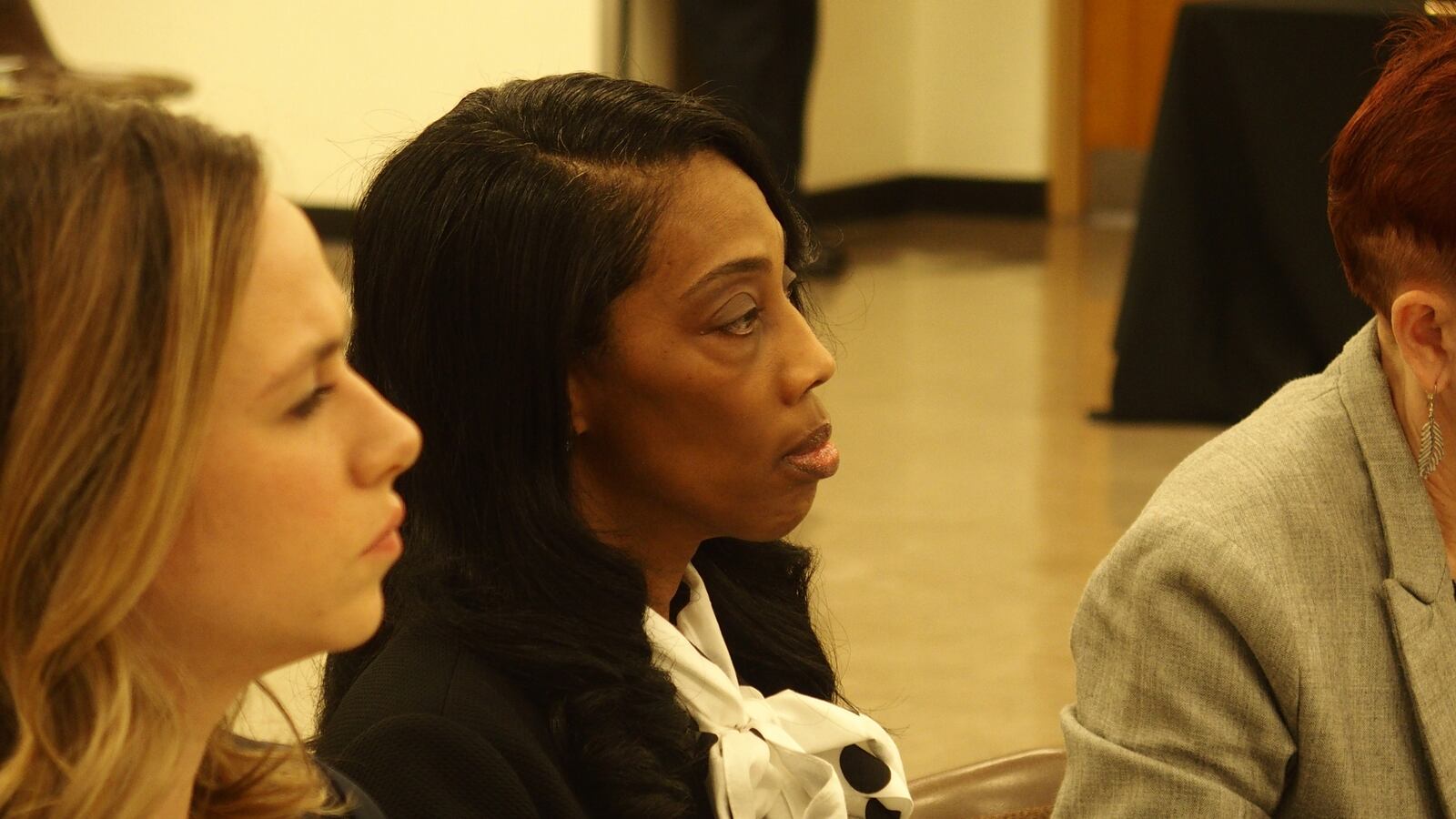The Memphis principal who was demoted last year over what district officials said were improper grade changes will not get her job back.
The Shelby County Schools board voted 6-0 Wednesday evening not to reinstate Monekea Smith, the former principal of Hamilton High School, and denied her requests for back pay and compensation for her attorney fees. Board members Kevin Woods, Scott McCormick, and Stephanie Love were absent for the vote.
The dispute between the district and Smith boils down to how principals show evidence of changes to student grades, which can be legitimate if a student completes a process known as course recovery or makeup assignments. Smith contends that the grade changes made on her watch, using her password, were justified and district officials failed to produce evidence to the contrary.
“All I am is a scapegoat for the district,” Smith told reporters after the school board’s decision.
Shelby County Schools suspended Smith in December 2017 and demoted her the following month. She was since re-assigned elsewhere in the district, though is not currently working.
Hamilton was the second high school implicated in a 2017 investigation into passing students who had not earned the credit. Two Trezevant High School staffers were fired, after Butler Snow, the law firm that Shelby County Schools retained, found a “pervasive” culture of grade changes at that school.
Both Trezevant and Hamilton high schools are part of the district’s prized Innovation Zone that has boosted state test scores in about two dozen of the lowest performing schools in Tennessee. Neither of the high schools, which entered the program in 2014, have exited the state’s list of low-performing schools.
Led by former U.S. attorney Ed Stanton, the investigation into Hamilton High School showed that Smith gave her password to the online grading system to Myron Huitt, a librarian. Huitt used that access to change 20 report card grades from failing to passing “without the knowledge and/or justification of the course’s assigned teacher,” which is against district policy. The district’s attorney noted Smith did not have the proper documentation required by the district to justify the revisions.
Huitt is still an employee of the district, according to Smith’s lawyer Maureen Holland.
“I never wrongfully changed grades. I never directed anyone to wrongfully change grades. I just don’t stand for that,” Smith told board members during the hearing.
Following the meeting, she went on to say that she had been following district protocol: “The district knows as principals we are told to give the kids a last-ditch effort, every opportunity to pass. We are told to come up with makeup packets. And then when the public finds out, they want to make like ‘Oh, we don’t tell you guys to do that.’ That is a lie.”
Smith also said that grades for online classes, such as the class at issue in this matter, needed to be transferred manually into the district’s grading system. She said that, in some cases, the legitimate input of grades showed up as grade changes.
Holland said Smith should have been given the same benefit of a doubt Shelby County Schools gave to other principals who lacked grade change forms that must be approved by the teacher and reviewed by the principal. The district halted a costly investigation into other high schools that were found to have high instances of grade changes because they lacked the proper documentation to prove or disprove wrongdoing.
Smith’s case began with a complaint that a former teacher, Michael Pleasants, filed, asserting that administrators had increased the grades he assigned for some makeup assignments to justify the students’ final grade in his class.
“If I fail any kids that’s a really bad metric for a school. The only thing Hamilton had going for it as a metric was its graduation rate,” Pleasants, who is now working as a substitute teacher, told Chalkbeat by phone after the hearing.
He said Smith had put pressure on teachers “to pass students who otherwise would not have passed,” and to graduate those failing students.
Holland, meanwhile, called Pleasants as a “disgruntled employee” who knew he would soon be fired.
District officials also said that Smith had given Huitt her login credentials in violation of district instructions to safeguard passwords as displayed on its login screen. Smith testified it is common practice for principals to authorize another employee to make changes in the grading system, noting, “I don’t know how to go in there and work that system. We (principals) just oversee it.”
Almost exactly a year ago, 200 students walked out of class to protest Smith’s suspension that led to her demotion.
“If you don’t trust her with some grades why would you give her a teaching job where she could mess with grades if it was a situation with grade changes? So, I didn’t understand that,” Danyell McAdams, the school’s former student body president, who organized the protest, told Chalkbeat on Tuesday.
Since the scandal surfaced at Trezevant High School in 2016, Shelby County Schools has restricted the number of employees authorized to make changes to a student’s report card or transcript, and requires monthly reports from principals, detailing any changes to grades. The district has also vowed to draft a new grade change policy and implement a new electronic grade-changing process.

